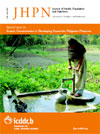
|
The Journal of Health, Population and Nutrition
icddr,b
ISSN: 1606-0997
EISSN: 1606-0997
Vol. 30, No. 4, 2012, pp. 472-486
|
 Bioline Code: hn12055
Bioline Code: hn12055
Full paper language: English
Document type: Research Article
Document available free of charge
|
|
|
The Journal of Health, Population and Nutrition, Vol. 30, No. 4, 2012, pp. 472-486
| en |
Indicators of Family Care for Development for Use in Multicountry Surveys
Kariger, Patricia; Frongillo, Edward A.; Engle, Patrice; Britto, Pia M. Rebello; Sywulka , Sara M. & Menon , Purnima
Abstract
Indicators of family care for development are essential for ascertaining whether families are providing their
children with an environment that leads to positive developmental outcomes. This project aimed to develop
indicators from a set of items, measuring family care practices and resources important for caregiving,
for use in epidemiologic surveys in developing countries. A mixed method (quantitative and qualitative)
design was used for item selection and evaluation. Qualitative and quantitative analyses were conducted to
examine the validity of candidate items in several country samples. Qualitative methods included the use
of global expert panels to identify and evaluate the performance of each candidate item as well as in-country
focus groups to test the content validity of the items. The quantitative methods included analyses of
item-response distributions, using bivariate techniques. The selected items measured two family care practices
(support for learning/stimulating environment and limit-setting techniques) and caregiving resources
(adequacy of the alternate caregiver when the mother worked). Six play-activity items, indicative of support
for learning/stimulating environment, were included in the core module of UNICEF’s Multiple Cluster
Indictor Survey 3. The other items were included in optional modules. This project provided, for the first
time, a globally-relevant set of items for assessing family care practices and resources in epidemiological
surveys. These items have multiple uses, including national monitoring and cross-country comparisons of
the status of family care for development used globally. The obtained information will reinforce attention
to efforts to improve the support for development of children.
Keywords
Child; Development; Disciplinary measures; Family care index; Family care indicators; Parenting
|
| |
© Copyright 2012 - Malaysian Journal of Medical Sciences
Alternative site location: http://www.jhpn.net
|
|
